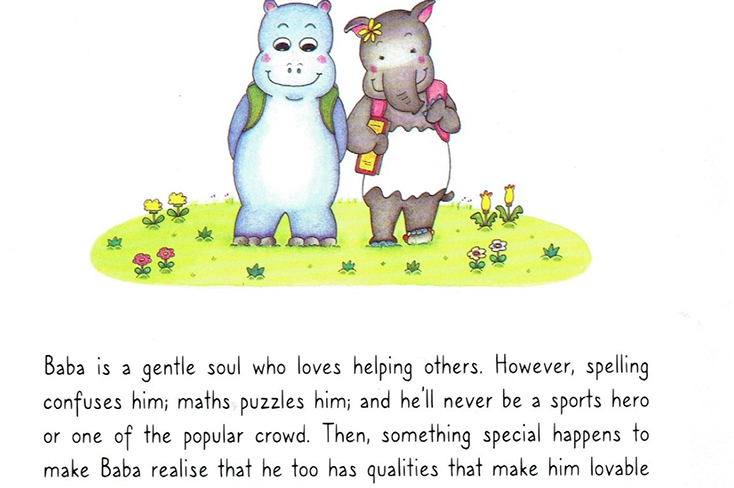University of Findlay Student Publishes Children’s Book
Since she was a child, University of Findlay graduate student and children’s book author/illustrator Hitomi Otani has been an avid reader. Her mother, she recalled, belonged to a picture book club when Otani was little, where the books were brought to their front door on a monthly basis. Being raised in an environment in which she was surrounded by creativity – her mother writes Japanese poetry and her late father painted – created in her a thirst for expression. By her own admittance, she was not a particularly artistic child; but, since she had nearly unlimited access to books and art supplies, she read and drew quite a lot.
It stands to reason, then, that Otani, who resides in the countryside in Gifu, Japan with her mother, younger brother, and sister-in-law, would continue to express herself through books. Most recently, Otani wrote and illustrated the children’s book titled Be Yourself, Baba! in which a gentle soul who loves helping others, struggles to do well academically.
Otani earned an undergraduate degree in English literature from Kyoto University in Japan, before moving to Los Angeles to study English and obtain a certificate of Teaching English as a Foreign Language. She has been teaching English for more than 20 years, to mostly Japanese students, and is now back in Japan working remotely toward graduating in December with an MAE in Children’s Literature from UF. She discovered the University, she said, when she was looking for a graduate school offering a distance learning course related to children’s literature. She noted that, among the schools she inquired about, the response from UF was the most supportive, partly because of professor of education Dr. Melissa Cain. “During the process, I was able to get to know Dr. Cain and our email exchanges about creating books and publishing were very precious, helpful, and meaningful. That was one of the reasons I was drawn to UF,” she explained. Cain suggested to Otani that she attend the Mazza Summer Conference, which she did, and Otani, by her own admission, fell in love with the collections of the Museum and the hospitality she received from the UF community during her stay as a result.
“I was able to spend time with [Otani] in person that summer and my husband and I enjoyed an Ohio summer BBQ with her, complete with Ohio sweet corn on the cob,” Cain said. “She took several of my courses and was a joy to work with. Beyond that, I have enjoyed corresponding with her as we share a love of children’s literature and writing. Hitomi Otani has become a cherished friend.”
While Otani has learned a great deal about education and children’s literature from her graduate classes at UF, she confessed that she couldn’t utilize it for Be Yourself, Baba because the editing process was already done by the time she became a student. “But,” she said, “I have another two book projects, so I changed my Dummy [a mock-up of the proposed publication], and revised my manuscript, and input everything I learned about picture books from the classes, like the depth of the story, crafting, visual literacy, and the elements of illustrations.”
Otani described Be Yourself, Baba as a “book about kindness,” and one that should foster understanding in those who read it. When Baba hopes to make friends with Hana, the most popular, smartest girl in school, his friend advises Baba to do something great in front of Hana to impress her. Baba tries to find what he is good at and to show how great he can be. Failing all attempts, Baba has difficulty dealing with his self-esteem. At the end of the book, however, a big surprise will make him realize that he has a precious quality that is unique to him. “It is not so obvious in the book, but Baba has a bit of a learning disability and is quite invisible at school,” Otani explained. “[An] invisible one like Baba will have not many chances to get any school prizes or be admired as a school hero, but his kindness and attitude to offer help to others should be valued and recognized. He can see what others need and will stand up without hesitating.”
The Mazza Museum will sell the book, and Ben Sapp, director of the Museum, said that he was “excited to learn that one of our graduate students has had her first book published by a major publishing house. This is the first year that we have offered breakout sessions for SCBWI (Society of Children’s Book Writers and Illustrators) members, or those hoping to write and illustrate picture books at Summer Conference. Hitomi sharing her experience will be perfect for these conference attendees.”
Otani said she’s used more of the education she’s obtained from UF for two more projects for which she wants to find a publisher. Her agent is currently “searching for a home for one of them,” and she’s “keeping her fingers crossed.” In the meantime, her advice to other burgeoning author/illustrators and other creative-types is to “keep creating and giving a voice through the work to those who feel unheard.”

